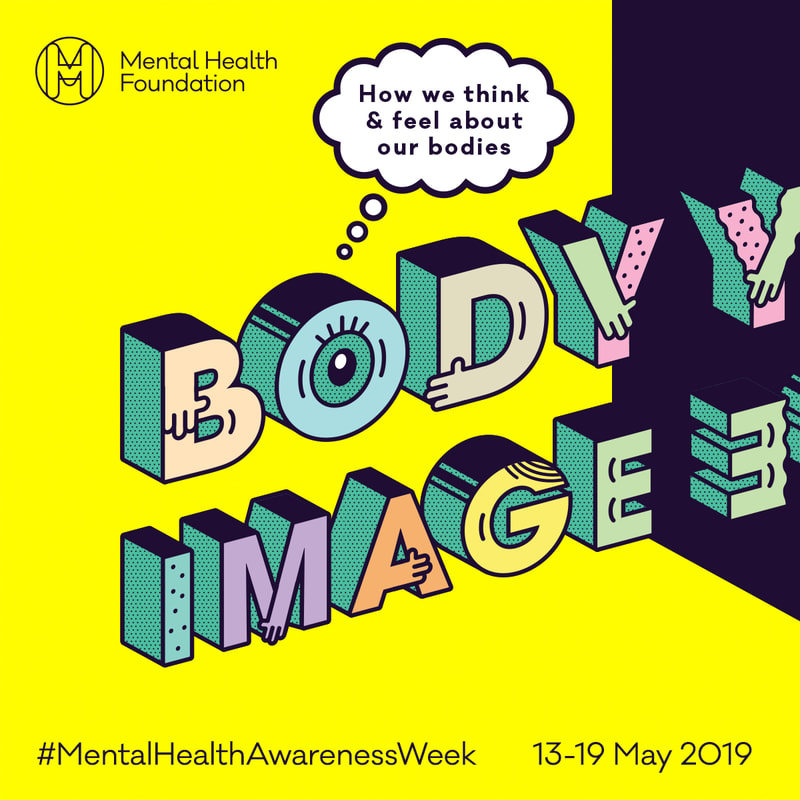This year’s Mental Health Awareness Week is focusing on body image. Running from 13th-19th May, the aim is to increase awareness of how we think and feel about our bodies, and how that affects our mental health.
What is body image?
Body image refers to how we see our bodies, and what we feel about them. This can be our body size or shape, skin colour, appearance, facial features or physical disabilities. It’s also how we believe others see us.
What influences body image?
Often, we hold an image in our head of what our bodies “should” look like. This image may come from seeing pictures of people on social media, or in films, music videos, on television or in magazines.
Our ideal image of ourselves may also be the result of comments from family and friends, or from childhood or adult bullying.
Cultural expectations, as well as those related to our age and gender, also play a part in creating our view of what our bodies “should” look like.
How does body image affect mental health?
When we look at ourselves in the mirror and we don’t see our ideal body, it can create feelings of disappointment, shame and distress.
The latest body image report by the Mental Health Foundation has found over a third of all adults have felt anxious or depressed because of concerns about their body image, while one in five have experienced shame.
Having a negative body image can result in low self-esteem, anxiety and depression. It can also lead to unhealthy exercise and eating patterns. For some, this can develop into eating disorders such as anorexia and bulimia, or into body dismorphic disorder.
How to improve your body image
It’s important to your mental wellbeing to have a positive body image. To help improve how you think and feel about your appearance, try these tips:
- Write down things you like about yourself – these don’t necessarily need to be related to your appearance. Look at the list often to focus on positives, rather than negatives
- Don’t dismiss compliments – people give compliments because they notice brilliant things about you. Rather than dismissing them, thank the person, accept the compliment, and write it down to remind yourself of it at difficult times
- Stop comparing yourself to others – notice when comparing yourself to others is making you feel worse about your body image. To stop doing this, you may need to…
- Change the way you use social media – surrounding yourself with filtered and airbrushed images is unhelpful. Consider unfollowing accounts that show “perfect” bodies, or take a break from using it
- Think what you would say to a friend – what would you say to a friend who felt negatively about how they look? Use the same kind, compassionate voice to talk to yourself
- Surround yourself with people who make you feel good – if you know people who make you feel worse about your appearance, try to spend less time with them. Focus on relationships that are positive and supportive – people who can be your cheerleaders
- Do regular self-care – listen to what your body needs, and look after it. This might be taking a nap, relaxing or having a bath. Doing this shows you love and care for your body
- Celebrate your body – think of all the amazing things it’s allowed you to do: your successes, achievements and the things you’ve experienced. Your body is amazing!
Seeking help and support
If you’re struggling with your body image and it’s affecting your mental health, talk to someone you’re close to, your GP or to a therapist. Talking through your thoughts and feelings can be really helpful, because body image isn’t about how you look, but how you feel about how you look.
Visiting your GP is particularly important if you’re concerned you may have an eating disorder or body dismorphic disorder. Your GP will be able to discuss treatment options, which may include medication, therapy or a referral to a specialist service. There may also be local support groups or services your GP can recommend.
If you’re experiencing difficulty with your body image and it’s affecting your mental health, get in touch to make an appointment and take a step towards making positive change.



 RSS Feed
RSS Feed